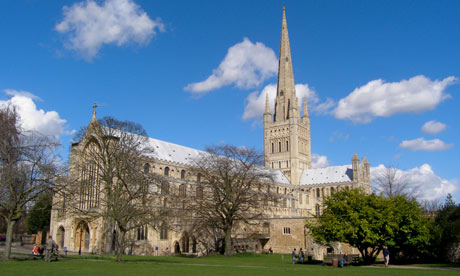
Thursday's announcement that Norwich has been named a Unesco city of literature provoked jubilation around the city. Or to put it more truthfully, around the Twitter streams of people who live here. I didn't actually leave the house, but the atmosphere was clear enough from all the local writers, journalists, book shop owners and event organisers expressing their happiness in less than 140 characters. There was no doubt that this was a good thing.
Rather less certain was what the new status involves. The name is an honorarium as much as anything. There is no pot of gold at the end of the several-year-long bidding process, just an impressive sounding label. The title is granted in perpetuity. Norwich will be plugged in to a network of existing cities of literature (the other five so far are Edinburgh, Iowa City, Reykjavik, Dublin and Melbourne ) and will also be expected to reach out to others hoping to put their own bids together. The hope is that this will involve Norwich in useful projects in the developing world and allow the city to forge potentially lucrative links with growing Asian economies.
Yet while the concrete benefits are perhaps amorphous, Chris Gribble, chief executive of the Writers' Centre Norwich, the organisation that put together the bid, is keen to stress his delight and the other benefits the award will bring. "It allows us to identify in a way no other city in England can. It's a great branding tool, it puts us in an elite club and we're going to be able to put together all kinds of interesting and exciting things that can wear the Unesco badge."
As you might expect, those interesting things include literary events and readings, but there are also more unique projects. There is, for instance, a plan to build a large international centre for writing in Norwich – which will provide space for more readings and events, but also contain a small flat for a writer in residence, and a large cafe and writing space where people like me will be able to go and type all day without the usual need to buy a coffee every 30 minutes to justify being there ...
Just as interesting is the ongoing translation of Meir Ben Elijah. Meir was a resident of Norwich and part of its thriving medieval Jewish community in the 13th century – until a blood libel and subsequent pogrom destroyed his life. He wrote his community's suffering in moving detail, although few knew about his work until it was rediscovered in (curiously) a Vatican library 700 years later and the fact that is being translated now is a direct result of the research that went into putting together the Unesco bid.
It's the existence of characters like Meir Ben Elijah, meanwhile, that helps answer the second question everyone has about the city's Unesco status, which is: why Norwich? Why should a place that most people know only as the erstwhile home of Bernard Matthews and Alan Partridge deserve such a distinction? Chris Gribble is aware of this. "It's really easy to take the piss out of Norwich," he says, truthfully enough. "Our strengths too often go under the radar. But at the same time as being more representative of most places in the UK than bigger metropolitan cities like Manchester or London, we're a very beautiful city and a European city and we're doing things our own way and it's great to have third-party validation on that."
The bid team also point to Norwich's distinguished ongoing literary history: "Norwich has a literary tradition going back more than 900 years that includes being home to the first book published in English by a woman (Julian of Norwich), the first recognisable novel, the first blank verse, the first provincial library and newspaper, the first British MA in Creative Writing (whose first student was Ian McEwan), the first UK City of Refuge for persecuted writers and the busiest and most used public library for each of the past five years."
If you're wondering, that first novel claim relates to the work of one Thomas Deloney, a 16th-century balladeer whose prose narratives are said to be the first recognisable examples of the novel form. Said by some people, anyway. There's a long conversation to be had about why – say – Petronius' Satyricon shouldn't be called the first novel, but that's a different subject. The fact remains that Norwich has – and has had – more going on than most people give it credit for.
On a more personal note, I can vouch for the fact that Norwich is a good place for writers. That's the very reason I moved here in fact. Some of this is simple economics and aesthetics. Norwich is cheaper than most comparably sized cities within two hours of London and also much prettier. But there's also a thriving community of writers and journalists living here. When I made the move, I thought I was a pioneer, but it turns out I was just enacting a cliche. Half my neighbours seem to have a novel in the pipeline, a newspaper column, a job in publishing, an eccentric authorial uncle ...
Since moving here I've also met countless writers who just happen to be passing through, giving talks or working with the Writers' Centre or UEA creative writing programme. I've picked up various and interesting scraps of work related to publishing and creative writing programmes around the city. I've attended countless book shop talks and sold-out theatre events with big-name writers like Ian McEwan and Martin Amis. I've even been persuaded to help set up a small publishing company. Literature is in the air in Norwich. It may not be such an obvious choice as a literary city as somewhere like Paris or New York, but it certainly deserves a chance to get in the ring and prove itself.

